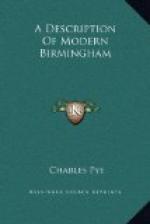This town, being considered a borough, by prescription for a number of years, was incorporated by letters patent, bearing date 22d February, in the 13th year of King Charles 2d; the government thereof is vested in a mayor, with the assistance of twenty-four capital burgesses, who are authorised to sue and are liable to be sued, by virtue of a common seal. William Webb was appointed the first mayor, whose successor is to be elected and sworn into office on the feast of St. Michael. The mayor and his brethren are authorised to fix upon a recorder and town clerk, who are empowered to hold a court of record, whenever it is requisite, to determine any actions or pleas, for sums of money exceeding forty shillings, and not more than twenty pounds. There are also two serjeants at mace, who are under their directions; the late mayor, and one other capital burgess, being in the commission of the peace for the borough and foreign, they have authority to take cognizance of all crimes committed within their jurisdiction, except conspiracy, murder, felony, or any thing touching the loss of life. They are also empowered to have a common prison, where all offenders may be detained, until discharged by due course of law. By this charter, the mayor, recorder, and twenty-four capital burgesses are exempt from serving upon any juries at Stafford.
The seal of this corporation is three fleur de lis and three lions quarterly, with two lions as supporters; over the arms is a crown without an arch, and over the rim of the crown there are five fleur de lis. It is nearly the size of a crown piece, with a latin inscription, in very ancient characters. It is deposited with Joseph Stubbs, who is town clerk, and steward of the manor to Lord Bradford. The arms of the town appear to be a bear with a ragged staff.
The guildhall is situated in the High-street, one wing of which is the Dragon inn, and the other is a large room where the corporation assemble to transact business, and is called the mayor’s parlour, under which is the prison for the town.
The ancient wooden staves belonging to the corporation are still deposited in the hall, and are curious relics of antiquity, being ornamented with heads of various animals, rudely carved.
The sheriff of the county, by his deputy, holds a court in this town, at the Castle inn, every third Monday, for the recovery of debts, under forty shillings; but the expenses are excessive to both debtor and creditor, and if the latter loses his cause, his expenses alone will amount to six or seven pounds.
In the year 1452, Thomas Mosely, of Moxhull, in Warwickshire, being then lord of Bascote, in that county, gave it in trust to William Lyle and Thomas Magot, for the use of the town of Walsall. In 1539, the inhabitants were summoned by the bellman to repair to the church, where a dole was distributed, amounting to the sum of seven pounds, ten shillings, and nine-pence. Some time after, an attempt was made to discontinue this dole, which caused the populace to assemble, who forced the same to be continued; at which time it was distributed to about fourteen thousand people, nine thousand of whom were supposed to reside in Walsall.




